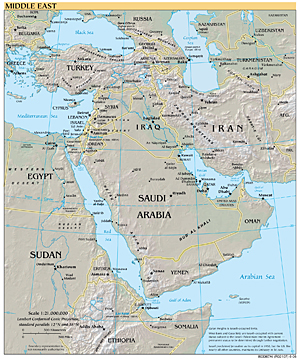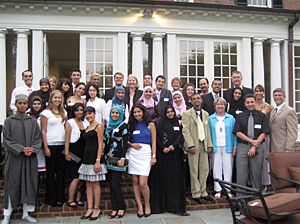
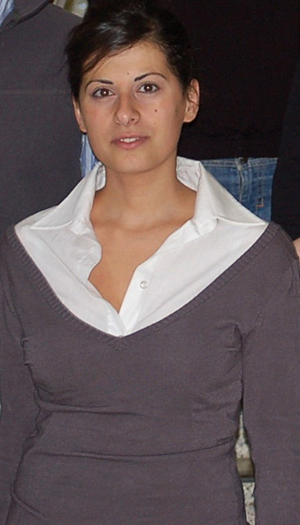
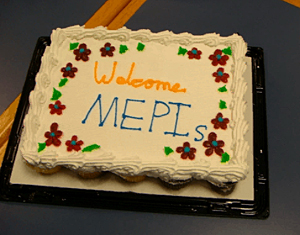
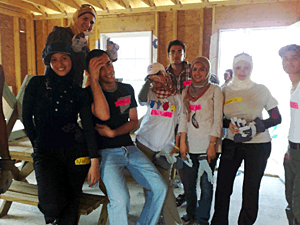
- Rozovsky wins prestigious NSF Early Career Award
- UD students meet alumni, experience 'closing bell' at NYSE
- Newark Police seek assistance in identifying suspects in robbery
- Rivlin says bipartisan budget action, stronger budget rules key to reversing debt
- Stink bugs shouldn't pose problem until late summer
- Gao to honor Placido Domingo in Washington performance
- Adopt-A-Highway project keeps Lewes road clean
- WVUD's Radiothon fundraiser runs April 1-10
- W.D. Snodgrass Symposium to honor Pulitzer winner
- New guide helps cancer patients manage symptoms
- UD in the News, March 25, 2011
- For the Record, March 25, 2011
- Public opinion expert discusses world views of U.S. in Global Agenda series
- Congressional delegation, dean laud Center for Community Research and Service program
- Center for Political Communication sets symposium on politics, entertainment
- Students work to raise funds, awareness of domestic violence
- Equestrian team wins regional championship in Western riding
- Markell, Harker stress importance of agriculture to Delaware's economy
- Carol A. Ammon MBA Case Competition winners announced
- Prof presents blood-clotting studies at Gordon Research Conference
- Sexual Assault Awareness Month events, programs announced
- Stay connected with Sea Grant, CEOE e-newsletter
- A message to UD regarding the tragedy in Japan
- More News >>
- March 31-May 14: REP stages Neil Simon's 'The Good Doctor'
- April 2: Newark plans annual 'wine and dine'
- April 5: Expert perspective on U.S. health care
- April 5: Comedian Ace Guillen to visit Scrounge
- April 6, May 4: School of Nursing sponsors research lecture series
- April 6-May 4: Confucius Institute presents Chinese Film Series on Wednesdays
- April 6: IPCC's Pachauri to discuss sustainable development in DENIN Dialogue Series
- April 7: 'WVUDstock' radiothon concert announced
- April 8: English Language Institute presents 'Arts in Translation'
- April 9: Green and Healthy Living Expo planned at The Bob
- April 9: Center for Political Communication to host Onion editor
- April 10: Alumni Easter Egg-stravaganza planned
- April 11: CDS session to focus on visual assistive technologies
- April 12: T.J. Stiles to speak at UDLA annual dinner
- April 15, 16: Annual UD push lawnmower tune-up scheduled
- April 15, 16: Master Players series presents iMusic 4, China Magpie
- April 15, 16: Delaware Symphony, UD chorus to perform Mahler work
- April 18: Former NFL Coach Bill Cowher featured in UD Speaks
- April 21-24: Sesame Street Live brings Elmo and friends to The Bob
- April 30: Save the date for Ag Day 2011 at UD
- April 30: Symposium to consider 'Frontiers at the Chemistry-Biology Interface'
- April 30-May 1: Relay for Life set at Delaware Field House
- May 4: Delaware Membrane Protein Symposium announced
- May 5: Northwestern University's Leon Keer to deliver Kerr lecture
- May 7: Women's volleyball team to host second annual Spring Fling
- Through May 3: SPPA announces speakers for 10th annual lecture series
- Through May 4: Global Agenda sees U.S. through others' eyes; World Bank president to speak
- Through May 4: 'Research on Race, Ethnicity, Culture' topic of series
- Through May 9: Black American Studies announces lecture series
- Through May 11: 'Challenges in Jewish Culture' lecture series announced
- Through May 11: Area Studies research featured in speaker series
- Through June 5: 'Andy Warhol: Behind the Camera' on view in Old College Gallery
- Through July 15: 'Bodyscapes' on view at Mechanical Hall Gallery
- More What's Happening >>
- UD calendar >>
- Middle States evaluation team on campus April 5
- Phipps named HR Liaison of the Quarter
- Senior wins iPad for participating in assessment study
- April 19: Procurement Services schedules information sessions
- UD Bookstore announces spring break hours
- HealthyU Wellness Program encourages employees to 'Step into Spring'
- April 8-29: Faculty roundtable series considers student engagement
- GRE is changing; learn more at April 15 info session
- April 30: UD Evening with Blue Rocks set for employees
- Morris Library to be open 24/7 during final exams
- More Campus FYI >>
2:41 p.m., April 9, 2009----Sara Chehab, a native of Lebanon, didn't expect Americans to be “so welcoming, friendly, and generous.”
“For us, the idea of a 'Westerner' is all about individualism, materialism, and self-centeredness,” she says.
The Summer Institute on American Studies and Leadership, hosted by the University of Delaware and sponsored through the Middle East Partnership Initiative (MEPI) and the U.S. Department of State, changed Chehab's mind. She was one of 20 undergraduates from 15 Arab countries who participated in the program at UD in 2004.
“The MEPI program is a life-changing experience,” says Chehab. “It allows you to discover American culture and traditions, meet people from all over the Middle East and North Africa, and go to places you had only seen on TV or heard about,” Chehab notes. “But I think the most important thing MEPI does is that it abolishes long-held stereotypes Arabs have about the U.S. and about one another's countries.”
MEPI was established in 2002 by then-Secretary of State Colin Powell to advance democratic reform and prosperous societies in the Middle East and North Africa. The initiative works closely with governments in the Arab world, academic institutions, the private sector, and non-governmental organizations.
The U.S. State Department recently selected the University of Delaware for a record sixth time to serve as a host institution for the six-week program, which is supported by a $454,843 grant. Since the first program at UD in 2004, more than 100 undergraduate students from the Middle East and North Africa have been welcomed to UD during the summer for six weeks of academic and community service activities.
“The University of Delaware is a recognized leader in international education,” says Havidán Rodriguez, vice provost for academic affairs and international programs. “UD was an early pioneer in study abroad and our campus is becoming increasingly internationalized, with planning now under way for the new Institute for Global Studies,” he notes. “The Middle East Partnership Initiative is a proven success in building bridges between different cultures while promoting educational leadership and service.”
UD's program is managed by the Center for International Studies, with Jim Magee, professor of political science and international relations, as the academic director, and Audrey Helfman, associate professor of the Leadership Program in the School of Urban Affairs and Public Policy and associate policy scientist in UD's Institute for Public Administration, as leadership director.
Additionally, the Academic and Student Affairs Council has provided funds for a graduate student to assist with the design of the institute's component on civic engagement, which is a special focus this year, according to Lesa Griffiths, associate provost for international programs, who coordinates the institute.
“In addition to learning about the U.S. political, social, and economic environment, and principles such as freedom of expression and equality, students will be involved in public service projects in the greater Newark community,” Griffiths says.
The MEPI at UD also connects participating students to fellow students from other countries and cultures.
“I never thought I would meet people from Iraq, Jordan, Tunisia, and Morocco in my life!” Chehab notes. “Being able to interact with them for six weeks and getting to know their countries was an eye-opener. Today, these people are among my closest friends.
“I also enjoyed meeting a lot of Americans and visiting their homes,” Chehab says, noting that she had some idea what to expect because her father does business with a U.S. company. “Now I really have an accurate picture of what it's like to be an American and can make the distinction between the U.S. and U.S. foreign policy, a distinction which most people in the world fail to make.”
The MEPI program also is the reason why Chehab is at UD today.
“Because the program is partly administered by the Department of Political Science and International Relations, and as a political science major myself, I was able to meet and talk to many professors in the department who encouraged me to apply for graduate school at UD,” she says. “I had never thought about this option prior to MEPI. And today, here I am, completing my Ph.D. in political science!”
Naoufaul El-Lamrani and Lukman Arsalan, who participated in the UD program, are featured on the MEPI Alumni Network Web page.
El-Lamrani created the Student Leaders Club at his university in Martil, Morocco. The club, which has grown nationwide, has conducted leadership workshops for pre-service secondary teachers, offered literacy classes for women, and held debates on such topics as the role of women, international terrorism, and AIDS.
Arsalan developed leadership courses in economics and entrepreneurship, which he presented at the United Nations University-International Leadership Institute in Amman, Jordan. He is now pursuing a graduate degree on a full scholarship at the Clinton School for Public Service at the University of Arkansas.
Article by Tracey Bryant



